I got some simple electret microphone modules and I've been experimenting with audio amplifiers. I googled to find some example circuits, and I found that most of them resemble the circuit above. I built this one and it works fine. If I'm not mistaken, this circuit is biased using the collector feedback bias.
Searching for a circuit, I noticed that most electret microphone amplifier circuits use the collector feedback configuration. I wonder why is it so popular, over other usually more common configurations such as voltage divider bias? I understand that the use of feedback in this configuration causes the amp to be more stable, but wouldn't a voltage divider bias have the same advantage?
